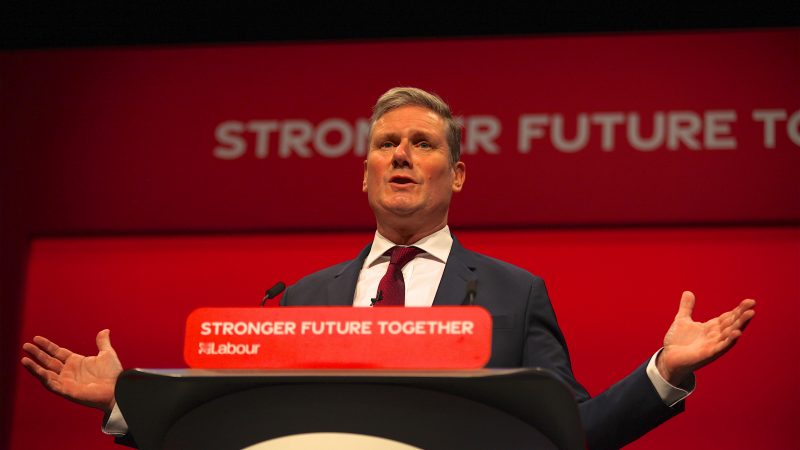
The approval of the UK’s first coalmine in 30 years has rightly been met with disapproval from local residents, climate campaigners, international envoys and even steel industry experts. Not only does a new mine make no long-term economic sense, but it is the latest in a long line of announcements that actively undermine the UK’s net-zero ambition. Although disapproval has been vocal from a range of audiences, there is an underlying feeling that a calculated political decision has been made. That voters, deep down, don’t really care enough about climate change to kick up a fuss about this.
But those of us who work on the issue of climate know that this is simply not true. A new polling report published this week adds to the litany of evidence that shows not only do the voting public recognise climate change as one of the biggest issues facing the country, but fundamentally understand that action on climate is crucial to the future economy of the UK. It also shows that for the Labour Party, leading on climate brings an array of electoral benefits.
Powering up: the electoral benefits of Labour’s climate leadership has been published as part of the launch of Labour Climate and Environment Forum (LCEF), a brand new independent organisation that aims to support the labour movement’s offer on climate and environment, working on nature, air quality and waste as well as climate issues. It aims to work across the entire labour movement – unions, activists, policymakers and many others – to provide briefings, develop knowledge and build consensus.
LCEF’s approach is to enable the labour movement to produce the ambitious policies needed to achieve the equitable and fair transition to the zero pollution, zero waste, naturally thriving world we all want to see. It will be working across all sections of the movement and its trustees include ex-Welsh First Minister Carwyn Jones, Baroness Young of Old Scone and Kate Bell, assistant general secretary of the TUC.
The Powering Up report has used polling to test different group’s views on the Labour Party after seeing a different range of videos. The top line is that seeing Keir Starmer talking about climate change added eight percentage points to Labour voting intention. 53% of the public said they intended to vote Labour after seeing a clip of Starmer talking on climate leadership from this year’s conference speech. This is compared to 47& for those who saw him talking about a different issue and 45% for those who saw no video at all.
Interestingly, the polling shows that over-40s and non-graduates, a key target demographic for both major political parties in upcoming elections, were more likely to be moved by the climate video, with bigger swings to Labour voting intention compared to under-40s and graduates.
The polling also shows that voters are more likely to think that senior Labour figures are doing a good job when they see them talking about climate. People who watched the Starmer climate video were 14 percentage points more likely to think he was doing a good job as leader compared to those who saw no video. And 35% of people who saw Rachel Reeves talking about climate leadership thought that she would make the best Chancellor against Jeremy Hunt on 27%. The figure for Rachel was higher from people who watched her climate video compared with 31% for those who saw her talking on a non-climate issue and 19% of those who saw no video of her at all.
The research included in the report shows that it is finally time to slay the myth that the public do not understand that short-term investment on climate reaps long-term economic rewards. Those who saw Starmer speak on climate were twelve percentage points more likely to say Labour was the best party on the economy compared to those who saw no video (43% vs 31%). And when asked to pick the policies that would best kickstart growth in the UK, the top two options were investment in renewables and improving housing energy efficiency.
But climate is not the only area where voters want to see action. When asked to pick their top environmental concerns, the polling showed nature loss, deforestation and water quality came out on top. Likewise, over 80% of those polled said that improving water quality should be the top environmental priority for any future Labour government.
The Powering Up report repeats, once again, that even under current economic constraints and uncertain global circumstances, environment remains a top concern for the British public. The polling shows climate is the fourth biggest issue facing the country, behind the economy, energy and health, all of which are impacted by climate too. But the general public have a better understanding of climate action than they are often giving credit for by politicians. They know that these climate concerns can lead to great opportunities.
The labour movement also needs to recognise the benefits that showcasing climate leadership brings for the next election. The party put green policies front and centre at its party conference this year and the polling shows it is now reaping the rewards for this.
This is because people understand the benefits that climate action will bring. Climate policies bring with them help with the cost-of-living crisis, healthier homes and families, and the easiest way to kick-start growth in the UK economy with jobs across the country. The public have a vision of the future with warmer homes, more renewables powering their local communities, and a natural world that is being restored. It is very hard to see where a coal mine fits into this vision.




More from LabourList
Government announce SEND reform in schools white paper
SPONSORED: ‘Industrial hemp and the challenge of turning Labour’s priorities into practice’
‘A day is a long time in politics, so we need ‘action this day’’